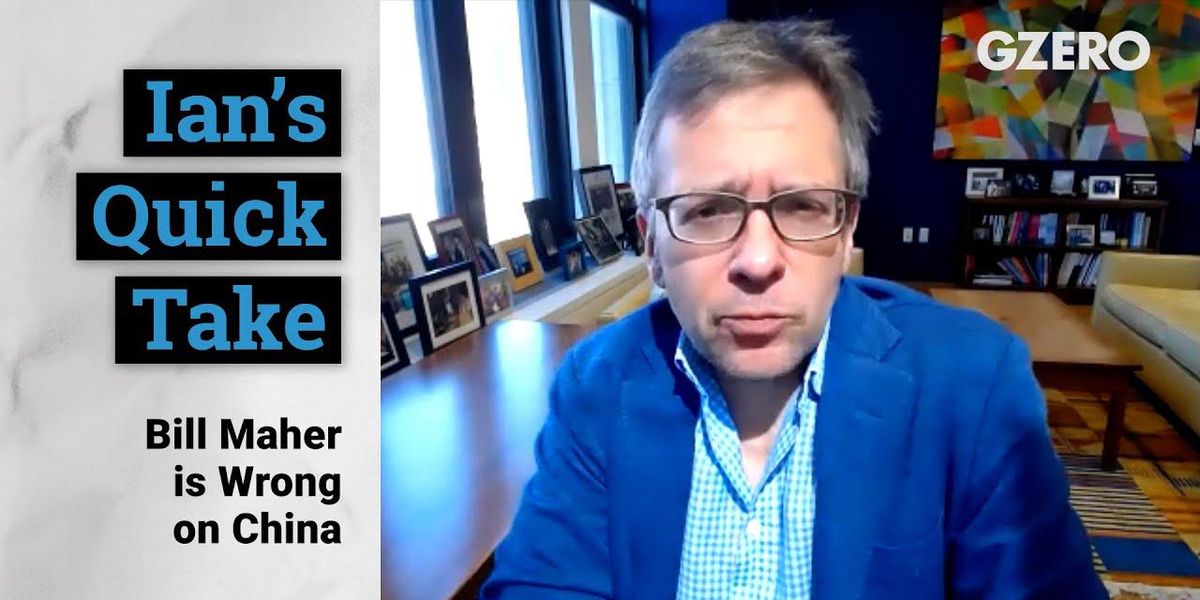Trending Now
We have updated our Privacy Policy and Terms of Use for Eurasia Group and its affiliates, including GZERO Media, to clarify the types of data we collect, how we collect it, how we use data and with whom we share data. By using our website you consent to our Terms and Conditions and Privacy Policy, including the transfer of your personal data to the United States from your country of residence, and our use of cookies described in our Cookie Policy.
{{ subpage.title }}
Is China "winning"? Ian Bremmer debates with Bill Maher on Real Time
Ian Bremmer and Bill Maher discussed the global leadership of the United States compared to that of China on a recent episode of Real Time. "The level of corruption in China, the level of corruption in China, even the buildings and the rails you talk about - the average building the Chinese build lasts for 20, 25 years. In the United States, it lasts for 40 to 50. There's a reason why we are still the world's most powerful country," Ian argued. "I'm just saying China's not eating our lunch - that's all."
Ian and Bill agreed that Biden's decision to fulfill his promise to take US troops out of Afghanistan is an admirable achievement and a sound strategic move. "We have the ability to send in special forces, we have intelligence. If what you're trying to do is stop terrorism, you don't need to be on the ground," Ian explained. "And what you're trying to do is improve the lives of Afghan people. We're going to be the world's leading vaccine exporter in a few months. We can help them."
Ian Bremmer Discusses US Afghanistan Withdrawal with Bill Maher on Real Timeyoutu.be
Bill Maher is wrong on China
Ian Bremmer's Quick Take:
Happy Monday, everybody. Ian Bremmer here, I've got your Quick Take to start off the week. And today I thought I would address the question, has China won? My friend Bill Maher made news in his always fun and entertaining and quite enjoyable show with a serious rant this past Friday, saying that "we're not a serious people in the United States, we can't do anything, we can't build anything, while China builds their economy and takes over the world. We lost. We just don't know it yet." Here, take a look.
Bill Maher: In two generations, China has built 500 entire cities from scratch. Moved the majority of their huge population from poverty to the middle class, and mostly cornered the market in 5G and pharmaceuticals. It's got to be something between authoritarian government that tells everyone what to do, and a representative government that can't do anything at all.
Now I got to say this, lots of good stuff in there and it's worth a watch, but I don't agree. And yes, I will say so next time I'm on the show.
China's rise is extraordinary. It's now the second largest economy in the world. China is on track to surpass the US economy now in 2028. Though, that's going to push back by at least a couple of years after this year, when the United States grows by probably 8% and China grows by 5% or a little bit less. They're a tech superpower, in relatively short order in some areas of technology, even on parity with that of the United States. But they're still a poor country, quite a poor country. The average income in China just over $10,000, in the United States it's over $50,000. The Chinese market is closed. They don't allow people to get capital out. And the reason for that is because there would be a lot of capital flight for Chinese investors and Chinese people with cash, that understand that the level of uncertainty of what happens to your money in a country like China, a closed economy, is vastly greater, and therefore unsafe, for you for your children for your future, than in an open economy like the United States.
Now, it's certainly true that China builds faster. They invest massively in infrastructure. Anyone that's been to China, and has been there repeatedly, sees how incredibly the landscape has been changing. Top-down, state directed investment. Yes, it's inefficient, but it moves. And it moves on the back of Chinese labor. It moves on the back of the Chinese government driving that strategy. I'd also note that the average building in China, life expectancy of that building before it falls apart, needs to be destroyed and you need to build another one, is about 35 years on average. It's more than double that in the United States. Quality of build, intrinsic corruption, mismanagement, matters a lot in a country that continues to be, yeah, that poor.
Now also keep in mind that after decades of not spending enough in the United States on our own infrastructure, that is about to change. I would make a very strong call that this year, on the back of the $1.9 trillion of relief and stimulus that we've just approved in the United States, on the back of $4 trillion last year responding to coronavirus. Put that together, it's by far the most effective wide reaching economic response of any major economy in the world. The US will also do another $2 or $3 trillion later this year. And if you're worried about the deficit, look, the fact that the United States has been under investing in human capital and infrastructure means we should do that with the world's reserve currency and with low interest rates and with human capital that's very well-educated on average, but has been under invested in. That's going to make a difference.
Further, coming out of coronavirus, best vaccines in the world, most effective new technologies, Moderna and Pfizer. The Chinese also have vaccines that they're rolling out. If you had to take them and you didn't have access to Moderna and Pfizer, you would take them. It looks like they are safe, but they are not as good. And the fact that the Chinese are now saying that they will expedite Hong Kong travel to the mainland if you've taken Chinese vaccines, but not if you've taken the more effective Moderna or Pfizer vaccines, that's not the kind of thing a country does when it's winning.
The Americans have by far the best universities in the world, dominate the league tables. Tsinghua in Beijing will soon enter the world leagues in terms of top universities in the world. And that's really impressive for a country that is as poor as China, but that's it. No other Chinese universities are close. And that's why Chinese families are willing to pay absolutely top rate to send their kids to second and third and fourth tier American universities, because it gives them a shot. Those are the best places to create opportunity in the future. China produces a lot more AI scientists than the United States, and the best of them desperately want to work in American technology companies. They'll make more, the entrepreneurship is there, that's where they can best assure their future.
I mean, I look at even something as simple as air quality. Beijing today, bringing in at 999 air quality index is like through the charts, staggering. Unhealthy to raise your kids in an urban environment like that. New York city today is 26. Because China, a poor country, still has to rely on so much dirty coal to produce their electricity. The United States, we don't. I mean, are there any Americans trying to get out of the US and desperate to live in China? No. While if you're Chinese and you had the opportunity to come to the United States, even though the American political system is deeply flawed, you still really want to be able to come to the US.
I can go on and on. Look, the United States is not the poster child for good governance these days. I've said it before, I will say it again, no one outside the US is looking at the US and saying, "My God, that is the ideal for the way I would want my government, my political system to work." No one's saying that. And in 1989, when the wall came down, a lot of people said that, and that is an embarrassment for the United States. It's something that is deeply flawed, and we need to spend a lot of time working on before we tell other countries how to run themselves. Our political divisions are horrific. The system has sclerosis. The regulatory environment is frequently captured by special interests, against the interest of average American citizens. We need to fix this. We're not fixing this. And as I said, China will become the largest economy in the world. They have 1.4 billion people compared to 400 million in the United States. I mean, it's not all that surprising, but to say that China has won, is emotional. It's not reality. USA.
That's it for this week, be safe and increasingly avoid fewer people. We're getting there.
Ian Bremmer discusses economic fallout on Real Time with Bill Maher
Ian Bremmer joined journalist Soledad O'Brien on a virtual panel for the latest episode of Real Time with Bill Maher, which aired on May 29th on HBO. In a discussion about who should will will take the blame for the US economy, Ian and Soledad debated which party and candidate are most impacted politically by the shutdown and economic fallout of the pandemic as the presidential election approaches.
Ian responded to Bill's question about what hitting the number of 100,000 coronavirus deaths in the US really means, noting that despite the tendency to blame Trump, the US "looks like a lot of other advanced industrial economies right now."
100k US Coronavirus Deaths in Perspective: Not Just Trump | Ian Bremmer on Real Time with Bill Maheryoutu.be
Ian Bremmer and Soledad O'Brien also assessed Trump's war with Twitter, his executive order and what the big tech/social media companies really think about free speech.
Does Trump's War with Twitter Really Matter? | Ian Bremmer on Real Time with Bill Maheryoutu.be


